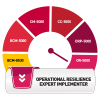Operational Resilience Policy: Difference between revisions
Jump to navigation
Jump to search
No edit summary |
No edit summary |
||
| Line 16: | Line 16: | ||
'''Related Terms''': [[Incident]], [[Incident Management Plan]], [[Incident Management Team]]. | '''Related Terms''': [[Operational Resilience Framework]], [[Incident]], [[Incident Management Plan]], [[Incident Management Team]]. | ||
{{Template:OR Course}}<br> | {{Template:OR Course}}<br> | ||
{{BcmBoK 0 CL 1B}}<br/> <br/> {{BcmBoK 0 CL 1C}}<br/> <br/> {{BcmBoK 0 CL 1CC}}<br/> <br/> {{BcmBoK 0 CL 1D}}<br/> <br/> {{BcmBoK 0 CL 1OR}} | {{BcmBoK 0 CL 1B}}<br/> <br/> {{BcmBoK 0 CL 1C}}<br/> <br/> {{BcmBoK 0 CL 1CC}}<br/> <br/> {{BcmBoK 0 CL 1D}}<br/> <br/> {{BcmBoK 0 CL 1OR}} | ||
Latest revision as of 22:36, 5 April 2025
| 1. Operational Resilience Policy is a formal document that defines the organisation’s stance, principles, and expectations regarding operational resilience.
Notes (1): It outlines senior management's commitment, sets high-level objectives, and defines governance and accountability. Notes (2): Its purpose is to establish the intent, guiding principles, and governance requirements for operational resilience. Notes (3): Its scope is narrower than the framework; focused on policy directives, boundaries, and oversight. Notes (4): Its focus is governance, compliance, and accountability.
Related Terms: Operational Resilience Framework, Incident, Incident Management Plan, Incident Management Team.
| |||||||||||||||||||||||||||||||||||

2. The process by which an organisation responds to and controls an incident using emergency response procedures or plans.
(Source: Business Continuity Institute - BCI)
